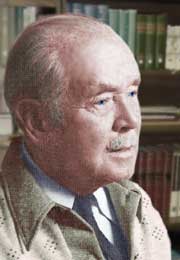Douglas Reed
As Egyptian journalist Mohamed Heikal notes in his foreword to the Arabic edition of Garaudy’s Founding Myths, Douglas Reed was a very influential writer who was later consigned to public oblivion for writing frankly about Zionist power.
Born in Britain in 1895, Reed began working at the age of 13 as an office boy. At age 19 he worked as a bank clerk until enlisting in the British army at the outbreak of the First World War. At the age of 26, and “relatively unschooled” (as he once described himself), he began working for the London Times as a telephonist and clerk. He reached journalism at the age of 30 as a sub-editor. Three years later he was the venerable paper’s assistant correspondent in Berlin, before transferring to Vienna as its chief central European correspondent. He went on to report, as a Times correspondent, from Warsaw, Moscow, Prague, Athens, Sofia, Bucharest, Budapest and other European centers.
He left The Times in 1938, almost simultaneously with the publication of his book Insanity Fair, which sold very well (including its US edition), and brought him world fame. He later wrote: “I let off all this pent-up steam and said just what I thought about the coming war and the folks who were letting it happen in a book, Insanity Fair.” A year later came another bestseller, Disgrace Abounding, and then others, including Prophet at Home, All Our Tomorrows, Lest We Regret, and Somewhere South of Suez. Reed also found time to write four novels and a play.
He provided readers with elegantly-crafted reporting and analysis based on seasoned but common-sense observations of the international scene. Although he addressed all the major issues of the day, it was his forthright writing on the machinations and impact of the Zionist movement that got him into trouble. In Somewhere South of Suez (London: 1950), for example, he wrote:
… During all that period and to the present time, it was not possible freely to report or discuss a third vital matter: Zionist Nationalism. In this case the freedom of the press has become a fallacy during the past two decades … When I came to America I found that this ban, for such it is in practice, prevailed even more rigidly than in my own country…. In daily usage, no American or British newspaper, apparently, now dares to print a line of news or comment unfavorable to the Zionist ambition … The inference to me is plain: the Zionist Nationalists are powerful enough to govern governments in the great countries of the remaining West!
In his next book Far and Wide (London: Jonathan Cape, 1951), Reed took a skeptical look at the much-hyped Jewish-Zionist claims of six million Jewish wartime deaths. He wrote:
During the Second World War I noticed that the figures of Jewish losses, in places where war made verification impossible, were being irresponsibly inflated, and said so in a book. The process continued until the war’s end when the figure of six millions was produced (and the Arabs were immediately chastised). A transparently worthless estimate was not only being used for mass-delusion through newspapers, but even given official status!
… No proof can be given that six million Jews ‘perished’; proof can be adduced that so many cound not have perished … Certain mathematical rules govern destruction on such a scale; you need pursuers, jailers, prisons, camps, transport, executioners in numbers inconceivable …
In a matter where nothing is verifiable, one thing seems sure: that six million Jews were never even contained in German-occupied territories … Yet this massive assertion about the six millions was used by politicians in the highest places, by prosecutors at Nuremberg, and habitually by mass-newspapers which in lesser matters would print no statement unverified!
The familiar six million figure, Reed went on, is “one which not bear any scrutiny by independent investigators.” Citing publicly available sources, he suggested that total Jewish wartime losses may have been between two and a half million and something more than three and a half million.
After the publication of Far and Wide, Reed was all but banned by establishment publishers. Still, he remained undaunted. His final book, The Controversy of Zion (Veritas [Australia] and Noontide [USA], 1985), provides a detailed and literate dissection of the origins and international impact of the Zionist movement, including its corrupting influence in Britain and the United States. Once again devoting several pages to the issue of Jewish wartime deaths, he concluded:
The starting point for consideration of this question [of Jewish wartime losses] is the fact that six million Jews, or anything approaching that number, cannot possibly have been ‘done to death’ or caused to ‘perish’ … The very assertion, made before the Nuremberg court, was an affront to their 815,000 fighting-men, sailors and civilians, killed in all theatres of war, of which only the Western politicians of this century would have been capable.
However little known Douglas Reed may be today, his work – as Mohamed Heikal’s foreword to the Arabic edition of Roger Garaudy’s book attests – has not gone entirely unappreciated.
—M. W.
Bibliographic information about this document: The Journal of Historical Review, vol. 19, no. 6 (November/December 2000), pp. 33f.
Other contributors to this document: n/a
Editor’s comments: n/a

